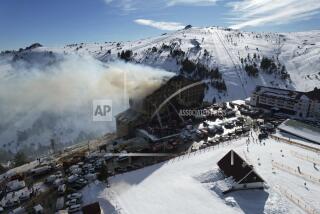Anguished Turks Wrestle With an Internal Enemy
- Share via
ISTANBUL, Turkey — Draped in green shrouds bearing Koranic verses, one coffin after another was carried to burial Friday as Turkey staggered from shock to outrage and struggled to fathom four devastating suicide bombings in five days.
Several suspects were reported arrested, and Turkish authorities were piecing together clues to shed light on connections between home-grown Islamic militants and their purported international partners as well as links between the bombings Thursday of British targets and the Nov. 15 attacks on two synagogues.
The death toll in the assaults on the British Consulate and a London-based bank’s Turkish headquarters rose to 32 on Friday, according to Istanbul police. That figure apparently included the two bombers. More than 500 people were injured in the shower of glass and flames unleashed by the detonation of two explosives-laden trucks.
U.S. and British authorities warned of the possibility of additional attacks and advised their citizens against travel here.
President Bush said Turkey, which straddles Europe and Asia and is considered a gateway between East and West, had become a new battleground in what he calls the global war on terrorism.
Turkish Foreign Minister Abdullah Gul confirmed the arrest of several suspects who were being interrogated, but he did not offer details.
The mass-circulation newspaper Hurriyet reported that seven people were in custody in connection with Thursday’s attacks. Investigators have identified the suicide bombers as two Turks, Azad Ekinci, 27, and Feridun Ugurlu, who also assisted in the synagogue attacks by using fake IDs to buy the pickup trucks that were packed with explosives, Hurriyet said.
The suspected bombers are believed to have been among hundreds of Turks who received training in the use of explosives and ultimately fought in Iran, Pakistan, Bosnia-Herzegovina or Afghanistan, officials said.
The attacks, whose cumulative death toll topped 50, “showed the need for intensifying regional and global cooperation for a more effective fight against terrorism in the international arena,” said Turkey’s leading civilian-military advisory council, which convened Friday to discuss alleged ties between Turks and foreign Islamic extremists.
Most of the dead were Muslims. In funerals Friday, hundreds of weeping Turks carried the victims’ caskets to their graves. Many asked why their people had been targeted.
“Even if it is an exaggeration to find similarities between these bombs and Sept. 11, our job is harder than that of the United States because our terrorists are not leaking in from outside,” wrote columnist Bekir Coskum in Friday’s Hurriyet.
“They are ours. There is no need for them to go to another country, to take other identities, to learn another language or to look as if they are from another religion.”
Earlier in the week, Turkish news reports identified the synagogue bombers as Mesut Cabuk and Gokhan Elaltintas.
The pair, along with Ekinci and Ugurlu, were from the predominantly Kurdish Bingol province in southeastern Turkey. Speaking to The Times, their relatives and friends expressed disbelief at the men’s involvement in the carnage.
The Internet cafe in Bingol that Elaltintas ran is still open for business. “He was going to leave the country, so he came to bid farewell to his dad,” said Cenk Aslan, who works at the cafe, recalling the last time he saw the alleged bomber.
But the governor of Bingol, Huseyin Avni Cos, said Elaltintas had links to the Turkish Hezbollah group and had been detained numerous times but was released.
The Turkish Hezbollah, which is not linked to the Shiite Muslim faction of the same name that is active in Lebanon, is a militant Islamic organization that fought Kurds in the 1980s and was suspected of being on the government’s payroll. In September, 130 of its members were released from prison under a government amnesty.
In the aftermath of the four bombings, there have been several claims of responsibility, including from people purporting to represent the Al Qaeda terrorist network. Turkish officials believe that the perpetrators are Turks acting with assistance or training from Al Qaeda or associated groups.
Turkish authorities have vowed to crush domestic terrorist networks, but outsiders worry that the government’s efforts will be too timid because of a shared religious ideology -- or too harsh because of pressure to crack down from the powerful armed forces.
“The question is how much power and influence these groups have within Turkey and what are their links to international groups,” a senior European diplomat said. “It doesn’t help the government’s credibility to point accusing fingers at the outside world to say that Turkey has not received enough help in its fight against terrorism.”
The attacks were an especially disheartening blow to Turkish citizens, who had seen their country pull itself out of political and economic crisis in recent months and for whom the future was starting to look bright.
Slowly, grief was being replaced by anger. Turks planned silent protest marches for later today.
Wilkinson is a Times staff writer and Zaman is a special correspondent.
More to Read
Sign up for Essential California
The most important California stories and recommendations in your inbox every morning.
You may occasionally receive promotional content from the Los Angeles Times.














